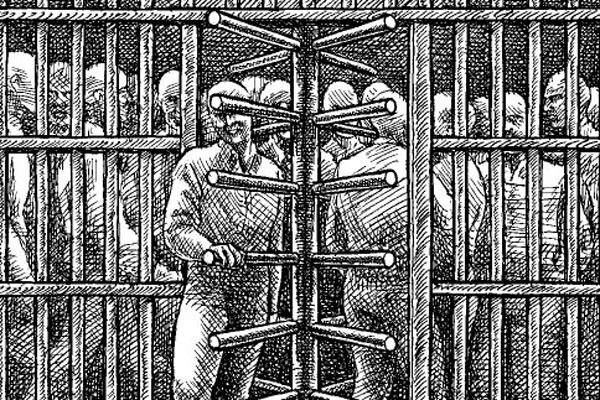 It is difficult, if not impossible, to pursue the goals of punishment at the same time as rehabilitation and reentry.
It is difficult, if not impossible, to pursue the goals of punishment at the same time as rehabilitation and reentry.
Probation is a punishment, and Rhode Island is a national leader in this form of punishment. As noted recently in the Providence Journal, the Governor’s workgroup is looking at ways to amend the state’s practices. Hopefully, any suggestions that pass the legislature or Department of Corrections are substantial and impactful. The crux of this, however, will depend on whether the state has an appetite to reduce punishments and thereby increase rehabilitation and reentry. Keep in mind that some people get sentenced directly to probation while others serve that sentence following a stint in prison.
As a former member and organizer with Direct Action for Rights and Equality (DARE) who has been serving a punishment for 22 years, I can tell you that many Rhode Islanders have been thinking long and hard about this topic, long before anyone could imagine a reduction in punishments for any offense. People are hampered in their attempts to live a productive life because of the crimes we have committed in the past, as there is a natural tendency to exclude us; however, this is reinforced by a probation status that serves to deny jobs, deny homes, deny education, and deny opportunities to help others.
DARE is the only membership-based grassroots organization in Rhode Island with a focus on criminal justice policies. Since forming our Behind the Walls committee in 1998, we are the only policy organization with formerly incarcerated people in leadership, and played a critical role in re-enfranchising people on probation and parole, reducing prison phone rates, ending mandatory minimum sentences, unshackling pregnant women, reducing employment discrimination with Ban the Box, ending probation violations based on dismissed new charges, and (soon) ending blanket discrimination in public housing.
As community members who are overwhelmingly impacted by criminal justice policies, we want to generate stability, support individuals and strengthen our community. Our membership is reflective of the low income communities of color that have the fewest resources to deal with unemployment, homelessness, mental illness, physical health, and substance abuse; i.e. the primary drivers of mass incarceration. Our community members are often both victims and perpetrators of crime, generally excluded from victims’ services once we are convicted. We live this issue, multi-generationally, in a state that has issued over 150,000 prison ID numbers in recent decades.
Ten years ago, DARE took an analytical approach to probation reform in Rhode Island. We knew the stories and lived the lives of people on probation. We recognized patterns of structural discrimination, financial hardship, and mental anguish that make it hard for any normal person to succeed. We recognize that probation is punishment, and the lengthy punishment of our family members, people living in our homes and raising our children, has been a disaster.
DARE articulated a four-point interlocking probation reform platform:
- Limit sentencing on violations to the time remaining on probation (Rule 32(f)). Thus, if one has a single day remaining on a 10-year probation term, they can only be sentenced to a single day. Whereas the status quo is that a judge may instead impose an entire 10-year suspended sentence, we believe this is not only morally flawed but also exceeds (in some cases) the statutory limits on certain crimes.
- Eliminate the 120-day limitation on filing a motion for a sentence reduction (Rule 35). Circumstances rarely change to justify a reduction within four months of the original sentence, yet when someone is serving a ten or fifty year sentence- they will often change over the years. Although the DOC can put some people on low supervision or banked status, their sentence has not ended for any of the structural discrimination purposes such as housing, employment, or volunteering. Nor are they free of the punishment’s mental and spiritual impacts.
- Extend Good Time to people on probation and parole (R.I.G.L. §42-56-24). This adjustment would have several effects, by (a) incentivizing good behavior, (b) naturally shortening sentences, and (c) allow probation officers and/or judges to take away earned Good Time for lower level infractions, similar to ACI discipline boards.
- Allow for violations to be dismissed where the new underlying charge is also dismissed (Rule 32(f)). This proposal passed the legislature after several years of advocacy. It was particularly frustrating when few people believed it was happening, and momentum shifted after Rep. Patrick O’Neill (a criminal defense attorney) interjected during a committee hearing that it is true: sometimes a new allegation comes along and within a few weeks the prosecutor offers a “deal” to plead guilty. If they don’t take the deal, then a maximum sentence on the probation violation is guaranteed. Defendants believe that guarantee, knowing the extremely low standard of guilt, eroded rules of evidence, and notorious cases such as Richard Beverly and Meko Lincoln. Both involved the dubious testimony of police officers ultimately revealed as criminals themselves. Most are “smarter” than Richard and Meko, accepting a few years in prison rather than risk lengthy violations.
These four reforms would reduce the number of people on probation, reduce the number of violations, incentivize good behavior, and allow people a better chance at a second chance.
There is no such thing as a second chance, a fresh start, or anything of the like while on probation. There has long been massive investment in low-income communities, however it has come in the form of police and prisons. Millions of dollars are spent in each neighborhood, although none of that money is an actual local investment. We are not widgets for processing, nor animals for study, nor wetlands to be saved. We are parents, children, brothers, sisters, workers, voters, and even policy experts.
We want a criminal justice system that can protect us without hurting us, where cages are a last resort, where punishments can end, and people can overcome their mistakes. We are the number one stakeholder in reducing overall crime and punishment, and reinvesting resources into affordable housing, jobs, education, along with a health care approach to addiction and mental illness.
I’ve long acknowledged that my sentence will never end, and do not take issue with that. I left Rhode Island to get an education, as my applications were rejected by Brown, URI, RISD, Salve Regina, Providence College, and Roger Williams Law School. Furthermore, several arts organizations, mentorships, and the Training School would not let me volunteer. Regardless of my own saga, Rhode Island needs to look at the systemic issues, and not isolate a few cases. To that end, the Governor would be well served to pick the brains of people who have lived these issues, from cradle to grave.
]]>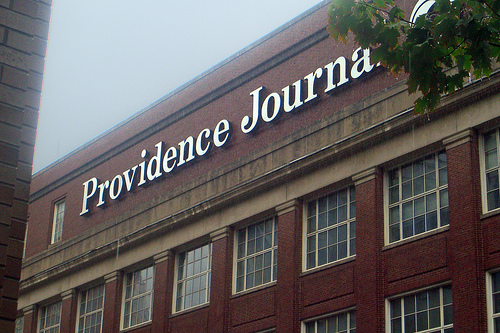 When ProJo ran my opinion piece, “Why Cianci’s conviction matters,” I knew what to expect. Someone would probably bring up my past in an effort to shoot the messenger. I figured it would be a Cianci supporter, or even a staffer, as any political campaign will typically have a comprehensive media strategy. Perhaps it would be someone troubled by my community involvement. The ironic part is it came from a left-leaning civil rights attorney who is actually reinforcing my message.
When ProJo ran my opinion piece, “Why Cianci’s conviction matters,” I knew what to expect. Someone would probably bring up my past in an effort to shoot the messenger. I figured it would be a Cianci supporter, or even a staffer, as any political campaign will typically have a comprehensive media strategy. Perhaps it would be someone troubled by my community involvement. The ironic part is it came from a left-leaning civil rights attorney who is actually reinforcing my message.
Oftentimes, one’s criminal history and the job they seek have little relation. Someone who sold drugs as a teenager may be a great chef, mechanic, or accountant. As a society, we should embrace those skills rather than send someone back into exile. And nothing is gained by continually referring to them as a “drug dealer” or “ex-con.” Someone who was responsible for a financial scandal or someone who molested children, however, will naturally give us pause when hiring them around money or kids. It’s really that simple. This is the nuance advocates must use to counter the alarmists who would prefer to keep barriers in place.
The discussion around Buddy Cianci as a “twice convicted felon” has gone without nuance, and totally conflated issues regarding people like us who may need a second or third chance. My ProJo piece was a brief attempt to provide some clarity, and to put Cianci’s job application in context of thousands in Providence who have convictions. I actually think he will be elected anyway, so its not an election I’m trying to influence but an issue I seek to discuss more intelligently than simple bashing and name-calling.
A Letter to the Editor followed my tepid piece on Buddy’s conviction in office (and I did not even get into his other alleged and admitted abuses of power). In response, the ProJo altered my bio to include my murder conviction, as this constitutes “brief biographical data that might color a writer’s views.” Color it how, one may ask? My bio had already included my work in supporting people like Cianci, and myself, having the right to work.
Naturally there will be many who feel that my conviction history and time in prison is relevant to my position. They may wonder what makes me a “criminal justice expert” beyond my years as an advocate, organizer, and my law degree. They might ask, as someone who fights so hard for the struggles of those of us with convictions, such as Buddy and myself, why I would not simply advocate for Buddy as “one of us.” But others might find my history as relevant because they wish to muddy the message.
Clearly those seeking to sully a writer’s name are trying to undermine the content of the writing. If I am a poor writer, don’t read it. If my facts are wrong, seek a correction. If my analysis is wrong, debate it. But any effort that basically condemns my right to write, and my right to share, is not far from saying Buddy Cianci has no right to work. As a limited public figure, I am open to criticisms. If I worked for an organization, obviously it should be identified so our agenda can be a factor.
Buddy has been highly paid for his opinions on the radio, and I think that has been a perfect job for him since his release from prison. He has added to the public discourse and clearly has a point of view to enrich many political discussions. I, on the other hand, have not been paid for my opinions at all, nor for the learning that fuels the analysis. Not by the ProJo, RI Future, or any of the other spaces through which I have shared.
If my conviction for interpersonal violence prohibits me from sharing an opinion from within the confines of my own home, how is that a Cianci supporter can justify a conviction for malfeasance in office not disqualify a man from working in that same office?
]]>Providence Superior Court Judge Lanphear recently ruled that the prosecutors and defense attorneys must tell judges of all plea agreements, although the top judge (Presiding Judge Alice Gibney) stated that Lanphear’s ruling does not apply across the entire court system. What impact does that have on a defendant, the one who is afforded constitutional protections and attorney-client privileges?
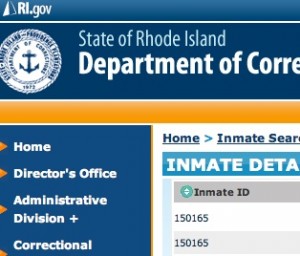 How many past and potential defendants are in Rhode Island?
How many past and potential defendants are in Rhode Island?
Not all criminal defendant’s pass through the Adult Correctional Institutions. Many will be arrested and released from the police station, so it is difficult to put a number on exactly how many people have been defendants in Rhode Island, a state of just one million people. The ACI has admitted over 150,000 people who were initially held without bail on a criminal charge. 90,000 of those people are over the past thirty years. But this is not all, because a decade ago the ACI began separately identifying people who were first admitted as probation violators; meaning, they had previously been arrested and convicted without having gone through the ACI. Now a subsequent issue (it could be a criminal allegation or as little as missing a meeting) has them being incarcerated. That tally is over 61,000.

Where 210,000 people hold unique prison identification numbers, perhaps the plea bargain is not so mysterious after all. Those people have families as well, so the number expands even further. Realistically, however, only a few thousand of those people really know how the “deal” works. The rest, as well as those of you not yet to get an ID number, might only figure it out when it is too late.
Having confidence, and confidentiality, with a lawyer.
Most defendants I’ve known don’t trust their lawyer, even the hired lawyers. This is not out of the norm with America’s disdain for lawyers, generally, despite continually electing them to political office. (Caveat: some of my best friends are lawyers.) I should point out that I’ve known thousands of defendants and served as a consultant on hundreds of cases for free. They trusted me because I had a reputation for confidentiality and nothing to gain, not a paycheck nor favor with my boss. Many defendants believe that a lawyer, whether privately retained or public defender, is just going through the motions. The defendant’s goal is to be in the “good” stack of people, those the lawyer “fights” for rather than those the lawyer “sells out.” They often believe a plea negotiation is “Listen, I’ll let you get this guy for twenty years but you gotta let these two guys get out on probation.”
Judge Lanphear is playing right into the conspiracy fears of defendants. He is making the attorneys into employees of the Court, rather than the client. The judge is adding extra players into the negotiation. Rather than parties A and B reach an agreement that C ratifies, he would like parties C and D to be privy for the ratification. Adding parties and expanding the morass to navigate will require more delays, status conferences, pretrial hearings, and time spent at the ACI. A 2012 legal victory in the U.S. Supreme Court held that defendants need to be told of all plea offers made by the government, ensuring full communication between attorney and client, but this is where the openness ends. An attorney has no duty, on behalf of a client, to inform judges (including Judge Lanphear) of a guilty plea in other courts. To hold those attorneys in contempt is to rewrite the code of ethics.
The Power of the Plea Bargain
People often forget that a defendant gives up quite a lot when pleading guilty, and provides significant relief to an overburdened criminal justice system. Judges and lawyers rarely mention the lifetime of discrimination (including legal restrictions) following a guilty plea, and rarely explain how easy it can be to fall within those 60,000 probation violators returning to the ACI- this time with practically no constitutional protections as the rules of evidence are far more lax and the burden of proof is merely based on a judge’s reasonable satisfaction that a probationer failed to keep the peace. Many times the only evidence comes from the arresting officer. It is for this reason we needed to amend the law so that people could not be violated and given prison time for charges that are ultimately dismissed. Of course the court, who years ago said “change the law,” are not satisfied the law was changed. Nor is the Attorney General, despite the fact that the predecessor who wrote the law supported the reform. (See: State v. Nelson, pending before the RI Supreme Court).
Defendants may eventually “crash the system,” when too many people refuse too many plea bargains. In New York City, for example, each of the 600,000 people who were infamously Stopped and Frisked by the NYPD, where no contraband was found, could have filed a harassment and/or civil rights complaint. The number of plaintiffs and cases were twice the 300,000 cases New York City courts initiated last year. The sheer volume would be a logistical nightmare, and the court would have begged them to consolidate into one single class action. That class action, coincidentally, proved victorious for the plaintiffs.
Defendants in Rhode Island have little faith in the system. Most of those who have done wrong are prepared to admit as much, which is one reason cases rarely go to trial. Prosecutors are even more overwhelmed than defense attorneys as police departments continue to funnel people into the ACI and the courts. Rhode Island public defenders have consistently had a policy of presenting several cases “ready for trial,” while the state then requests a continuance. A good attorney will speak with witnesses, review crime lab reports, and request court funds for expert witnesses. But rarely is that done on either side. It can all be avoided by going straight to “The Deal.”
Here is an example of The Deal, from State v. Isom, 62 A.3d 1120, 1123 (R.I. 2013):
“THE COURT: Okay. Thank you. Mr. Isom, did you have plenty of time to discuss this with your lawyer.
“THE DEFENDANT: Yes, ma’am.“THE COURT: And you understand that you have a right to the, a hearing on these violations?“THE DEFENDANT: Yes, ma’am.“THE COURT: And do you wish to give up your right to that hearing today and admit to the violations?“THE DEFENDANT: Yes, ma’am.“THE COURT: Okay. Understanding that you’re being sentenced to five years to serve on those violations, retroactive to the date of December 27th of last year?“THE DEFENDANT: Yes, ma’am.“THE COURT: Okay. Defendant admits and is declared to be a violator. That sentence just mentioned is imposed.“THE CLERK: Five years, is that coming off one of the specific cases * * *?“[THE PROSECUTOR]: That can come off of [the 2000 case], and that would leave a balance of eight years suspended with probation on that case. And the [2007] case may be continued on the same.“THE CLERK: Thank you
“THE COURT: All set.”
In this case, the Defendant returned to court because he mistakenly (yet reasonably) believed that the new allegations and the probation violation would be all “wrapped up” in one deal. That is the common practice, to wrap it up prior to the probation violation hearing that few (if any) defendants believe they can win- regardless of their innocence or guilt. He gave the system what it wanted, efficiency, in exchange for very little.
The longer a defendant is held without bail at the ACI, the more leverage against him or her to take the deal. The more suspended time looming over their heads, the more pressure to take the deal… or get slammed at the probation violation hearing. A defendant will often have two different judges: a Superior Court judge to oversee the felony arrest, and a District Court judge overseeing a lesser probation violation they face. Defendants may find themselves in front of one judge with the opportunity to “wrap it all up” within one deal. This saves everyone considerable time and money. Judge Lanphear is proposing to nullify that, creating more work and expending more time for everyone.
Will the System reform or collapse?
Those who read my blog know that I have a bias, but may also respect that I bluntly call it like it is. I have long felt that the demise of the criminal justice system as we know it will come if it collapses under its own weight. I do not foresee defendants taking collective action to crash the system, but they do not need to. The system already collectivizes their actions, as each unique identifying number requires judges, lawyers, bailiffs, clerks, sheriffs, marshals, police officers, and prison guards to process. Recent years have seen some take a reform approach due to the tax burden, changing attitudes on drug use, and cameras capturing abusive treatment that went disbelieved for far too long.
I wouldn’t read too much into Judge Lanphear’s ruling. When the rubber hits the road, including if his decision is reviewed by the Rhode Island Supreme Court, the system requires considerable latitude for negotiating the deal. It is a system that every Rhode Islander, based on the numbers, should be familiar with; someone in your family could be next.
]]>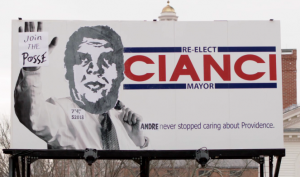 Buddy Cianci, the 73-year-old former mayor can probably think of no better way to go out than dying on a Kennedy Plaza throne and being brought down to Waterfire on a shield. Many people thought they have seen the last of him following five years in prison, but I’m pleased he is eligible to run for office regardless of his criminal history.
Buddy Cianci, the 73-year-old former mayor can probably think of no better way to go out than dying on a Kennedy Plaza throne and being brought down to Waterfire on a shield. Many people thought they have seen the last of him following five years in prison, but I’m pleased he is eligible to run for office regardless of his criminal history.
Buddy’s political career couldn’t be defeated after his first conviction, when some legal and political wrangling got the law bent for him to get back in office. His first conviction was, in some ways, like many others in Rhode Island: a guy loses his temper and gets violent. Whatever the true details, it had nothing to do with his mayoral duties or ability to run the city. Nobody but a Buddy Cianci, surrounded by a political machine, could possibly have gotten reelected for office after being sentenced to five years felony probation in 1984. In fact, a constitutional amendment was passed just a year later- amending the lifetime ban down to one where Cianci would need to wait three years after completing his probation.
In 1990, Cianci’s machine returned to power. A court even ruled that the three-year wait didn’t apply to people convicted prior to 1985. His criminal history, however, did not influence his political views. He didn’t push for new policies that took a rehabilitative approach to social problems. Many mayors do not, and typical to the position the Providence Police served their role in responding to the social dilemmas we still face, i.e. poverty, substance abuse, unemployment, lack of affordable housing, mental illness, and crumbling public education. Arrests lead to convictions lead to lifetimes of de-citizenship for those other than Buddy Cianci.
In 2005, a group of activists in Rhode Island came together to promote a more inclusive democracy and expand voting rights to people on probation and parole. This was especially important as Rhode Island disenfranchised people of color at higher numbers than the Deep South and is a national leader in lengthy probation sentences. Tens of thousands of Rhode Islanders lived and worked in the state, raising children, being good neighbors, yet could not take part in the democracy.
Buddy was not quite yesterday’s news in 2006, when the final proposals were being crafted. He had been indicted in 2001 after “Operation Plunderdome” exposed a classic political kickback scheme. He was amidst his five-year federal prison sentence for racketeering when we drafted the constitutional amendment regarding voting rights – and we considered the right to run for office as well. Based on some people’s well-founded concerns, and the need to avoid a “Buddy” debate, the limitation on running for office was left in place. Back then we just wanted to vote, and none of us wanted to be a politician anyway.
The three-year post-sentence ban ensured that Buddy would be ineligible for the last mayoral race. People expected that to be the end of him. After all, he wouldn’t be eligible for another mayoral run until he was 73. Who even makes it to 73?
The most fundamental aspect of a democracy is the right for a community to choose its own leaders. Eligibility requirements, such as residency for instance, should be limited to things ensuring that a person truly is a representative of the constituency. It may make sense to create policies that bar people with particular criminal histories from being barred from specific occupations. We do this all the time, and it is only the blanket bans that push the bounds of legitimacy and legality (well framed by the EEOC guidelines on employment for people with criminal convictions).
The poetic irony of those up in arms over Buddy’s eligibility is the fact that tens of thousands of Providence residents also have felony convictions. A significant percentage of children in Providence schools have a parent in prison, on probation, parole, or long since moved on from that past. Walk into any business and there is a good chance that someone with a conviction history is working there. They are cooking your food, fixing your vehicle, selling you products, and every other imaginable thing. Buddy did not take up the mantle for the challenges of other folks with conviction histories, thus he is not “representative” in that regard – but at this point we are all so intertwined that, generally, the conviction itself is irrelevant as to one being a good or bad person for the job.
People are free to elect bad leaders. Employers are also free to give people second chances. I confess to having never listened to Buddy Cianci’s radio show since his release from prison, nor have I tried his pasta sauce. He very well may be an out-of-touch old man who would surround himself with cronies, and the children of former cronies. He may paralyze the city, as it expends half its resources trying to be sure he doesn’t corruptly exploit the other half.
The city had over a decade to create a policy that barred people convicted for malfeasance in office for getting that same job back. Look to Cicilline, Lombardi, Taveras, Solomon and the like regarding that issue. It was really that simple and, who knows: perhaps there is still time?
I know first hand that people change. Some change through prison, others just pass adolescence, mourn the passing of a loved one, spend time in quite meditation, or any of the myriad ways we grow as human beings. Some people may not even want a “changed” Buddy as mayor; in fact, they want the same guy back in office. Either way, views on the integrity of every candidate belong in the campaign.
In the end, his eligibility is just like freedom of speech: I may not like what you say, but I’ll defend your right to say it.
]]>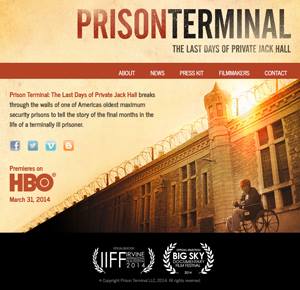 If there is one thing a documentary film should strive for, it is exposing people to a little-known aspect of life. This is precisely what filmmaker Edgar Barens has done with his Oscar nominated film, “Prison Terminal: The Last Days of Private Jack Hall.” It premieres on HBO, on March 31st, and is poised to stir up some substantial changes in America, the global incarceration leader, where approximately 250,000 aging people are behind bars.
If there is one thing a documentary film should strive for, it is exposing people to a little-known aspect of life. This is precisely what filmmaker Edgar Barens has done with his Oscar nominated film, “Prison Terminal: The Last Days of Private Jack Hall.” It premieres on HBO, on March 31st, and is poised to stir up some substantial changes in America, the global incarceration leader, where approximately 250,000 aging people are behind bars.
According to the Bureau of Justice Statistics, between 2001 and 2011, cancer and heart disease were the leading causes of over 3,000 annual deaths in state prisons. Another 1000 people die every year in local jails, often with little or no health care.
I met Edgar Barens in 2009, when he had 300 hours of footage from the Iowa State Penitentiary’s hospice unit, shot over six months in 2006-2007. Prison administrators invited him to do a story after seeing his previous documentary Angola Prison Hospice. This latest product is a 40-minute film nominated for an Academy Award. Coincidentally, Prison Terminal is about the death of Jack Hall, a World War II POW survivor, while the winning film was about the last survivor of the Holocaust.
Jack Hall is proud of his military service, yet remains haunted by the hundreds of farm boys, tradesmen, and regular folks he killed while wearing the uniform. It is interesting that the government awarded medals for these killings, but sentenced him to die in prison for killing the man who sold drugs to his son. The latter was probably the only time he had a genuine motivation to end someone’s life, but Jack’s story here is not about that homicide. The story is deeper, taking us to a crossroad of multiple dilemmas in America’s criminal justice system.
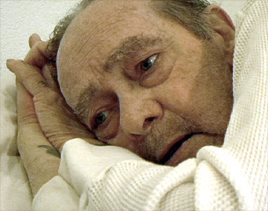
The Disposable Heroes
Incarcerated veterans are vastly growing in number, as they historically do after every war, with estimates ranging from 140,000 to 250,000 currently behind bars. It should come as no surprise that Jack Hall’s experience of killing, seeing friends die, and being held in an enemy prison might leave more than a few scars. It is understandable that any such person might seek to suppress their thoughts with alcohol or drugs, and may also have a hard time holding down a regular job. This PTSD and effects, and effects of effects, helps explain the record high disposable heroes currently locked up in prison after their Iraq and/or Afghanistan tours. It is only amplified by America’s shortcomings in soldier reentry and rehabilitation (words typically used for prisoners returning home, but soldiers’ experiences can be frighteningly similar).
At the heart of Prison Terminal is a hospice program, where fellow inmates are serving as the volunteers and providing end-of-life care. In another twist on presumptions, Jack is a former Segregationist who found himself living in the most intense racial experiment throughout history. The viewer doesn’t experience Jack’s evolution over the previous years, but what we see is the shared love and humility of two primary caretakers in action: “Herky,” and “Love,” both Black men. Both also convicted of killing someone and will apparently also die behind bars. As they see it, what they do for Jack will hopefully be done for them when the time comes.
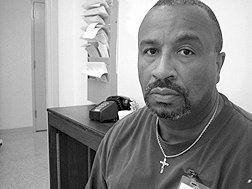
Many members of the general public develop their views of prisons through television shows such as Oz, Orange Is The New Black, and LockUp. Furthermore, most documentaries focus on a wronged situation, such as exonerations, drug war casualties, and political prisoners. Prison Terminal defies stereotypes and presents a familiar world to those who have been incarcerated, and their families. Herky and Love are like hundreds of people I know: just waiting for a burning car on the side of the road so they can save some kids. It will never erase the terrible things that gets someone into prison, but will at least make looking in the mirror a little easier by creating a counter-narrative, about helping humanity rather than hurting. Not to imply that everyone in prison is an angel, nor even that the majority are there for something terrible, but the number of lifelong malicious and selfish people in prisons is a far smaller than most would ever imagine.
It should not come as a massive surprise that the majority of hospice workers in Iowa are Black. As examined in the book, “Mothering in Prison,” some communities unfortunately have learned to expect travesties. Coming up out of slavery and through a challenging American history, Black people have had to adapt to survive, and take care of their wounded family. Here, Jack Hall is part of this family regardless of his color. And to Jack’s credit, healing his previously-strained relationship with the son who turned him in is a core part of the dying process.
Prisoner health care: an oxymoron
Prison health care in America primarily consists of popping pills, and scant staffs struggling with sparse budgets. If they are going to take control of someone’s body, the government has a legal and moral duty to take care of it. However, not every person enters prison with a clean bill of health. They go in with cancer, diabetes, HIV, and every other ailment afflicting the general public. Perhaps on the outside they had a job, insurance, or even coverage under the Affordable Care Act. And then they are sent into this jungle. The diet is terrible and, at times, the exercise non-existent. Leave someone in prison long enough and they will certainly contract any ailment one would expect on the outside.
There are only 75 hospices in the thousands of American jails and prisons, and only 20 are staffed with prisoner volunteers. People should die with their families, especially the ones closest to their hearts. Iowa’s hospice program struggled since the film was made, as a new director was not as passionate about the program. This signals the need for specific policies to be in place, to survive turnover and attitude. The program costs absolutely nothing, with everything donated (including hospital beds) or made by prisoners. Hospice actually saves money by weaning people off costly medications and treatments in their final days.
Some states have responded to the medical crisis by building multi-million dollar medical facilities that will need to be staffed and maintained over the years. This also creates more overall beds in the system; beds to be filled. Every prison should instead convert space already in place, and consider Medical Parole whenever possible. Not everyone has somewhere to go in the final years, and granting homelessness to sick people is not providing dignified deaths.
Edgar Barens is taking Prison Terminal on a tour that will include dozens of prisons throughout the nation. This film should be seen. A five-minute version should be screened for politicians. Hopefully they, like Iowa, will recognize that it is possible to do better. They can respect families and religions, and make a considerable reform within this terrible phenomenon of mass incarceration. Furthermore, the Veterans Affairs administrators can watch this film and reconsider the final crime in Jack’s case: the VA would not allow him to be buried with honors due to the “Timothy McVeigh” rule, barring people convicted of capital crimes from a final acknowledgment of their service. Jack’s final respite, despite fears his service would send him to Hell, was to be buried as a soldier. Instead, the prison fingerprinted and disposed of him, his life, and death.
Pvt. Jack Hall escaped from a POW camp, yet could not escape that one moment of rage as an unwilling soldier in the War on Drugs.
Find out more at www.prisonterminal.com.
]]> On Monday a group of people will sit down at Open Doors and talk about Senator Whitehouse’s bill to create a federal parole system.
On Monday a group of people will sit down at Open Doors and talk about Senator Whitehouse’s bill to create a federal parole system.
The bill is hailed as a “prison reform bill,” and passed the Senate Judiciary Committee; a clear indication of the shifting tide on political ideology over the past few years. This ebbing of the ‘Tough on Crime’ rhetoric includes many people who were bipartisan architects of the prison industry itself, and jibes with Attorney General Eric Holder’s public desire to make the system “more just.” Of course, this indicates he believes it is currently less just than it should be. The voices you have heard over the past several years talking “reform” are the result of those of us who have been peeing in the pool long enough to warm it up so everybody can get in. Even if just a toe, they’re getting in.
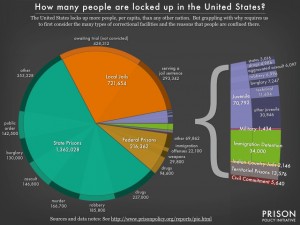 This prison reform bill is quite overstated however, and falls well short of what the public is truly calling for- something Senator Whitehouse appeared to be going for with his former bill to create a commission of experts that would propose a national overhaul. The Recidivism Reduction and Public Safety Act of 2014 will have no impact on state prisoners, where six times more men, women and children are serving prison terms than under federal law. Furthermore, it will have no impact on the 722,000 people currently sitting in a local jail- a snapshot of the 12 million who cycle through that system. Its not easy for the feds to control state crime and punishment under the law, but like anything else: the feds could put strings attached to all the financial subsidies of a bursting prison industry.
This prison reform bill is quite overstated however, and falls well short of what the public is truly calling for- something Senator Whitehouse appeared to be going for with his former bill to create a commission of experts that would propose a national overhaul. The Recidivism Reduction and Public Safety Act of 2014 will have no impact on state prisoners, where six times more men, women and children are serving prison terms than under federal law. Furthermore, it will have no impact on the 722,000 people currently sitting in a local jail- a snapshot of the 12 million who cycle through that system. Its not easy for the feds to control state crime and punishment under the law, but like anything else: the feds could put strings attached to all the financial subsidies of a bursting prison industry.
What’s in it for Rhode Island?
The bill will impact a few Rhode Islanders and tens of thousands of people nationally who will now gain an opportunity at parole, but what the bill deems “Prerelease Custody.” They can do this by engaging in what we once considered educational and rehabilitative programming, but the bill deems “Recidivism Reduction” programming. This wordsmithing is no different than calling oneself a “Pre-Owned Car Dealer” (which is what they do, these days). To assess the merits, it is important not to be distracted by shiny new things.
The Good Time credits earned by federal inmates are not for everybody, and they are not time off one’s sentence the way they commonly are applied to state custody. Furthermore, parolees in halfway houses and on electronic monitoring pay for their own incarceration, sometimes to their own financial ruin. Thus, this is not a handout by any means yet does pose a possibility for the prison system to generate additional revenues from the predominantly low-income and struggling families trying to rebuild a life after prison.
Slavery by another name: Prison Labor
The bill prioritizes an expansion of prison labor, viewed as a form of rehabilitation and method of reducing recidivism. It is impossible to discount the value of having a prison job for the prisoner, even at 12 cents per hour of income. However, it is difficult not to think of one ominous phrase “Arbeit Macht Frei” infamously posted over Camp Auschwitz. Work makes you free. A prison worker gets time off their sentence, and this bill calls for the Bureau of Prisons to review in what ways the prison labor force can be used to make goods currently manufactured overseas, so as not to cut into the free labor pool.
The use of prison labor is controversial, to say the least. Some critics have called for a repeal of the 13th Amendment, which provides for slavery of anyone convicted of a crime. This provision allowed for the massive “convict lease labor” that built a considerable amount of American infrastructure after slavery was abolished. The legal framework that is said to have freed Black America also allowed for people to be rounded up and placed, fundamentally, back where, essentially, Black America had been liberated from.
Today, prison labor exploiters capitalize upon incarcerated people’s desire to stay busy rather than sit on a bunk all day. This sort of macro-management does not take into account the relevance of a worker’s feelings. People in the system are treated with the callousness of lab rats, which may be all fine in the punishment phase, yet counterproductive when doing anti-recidivism, rehabilitative, or reentry programming. Does Johnny have a job, a home, or health care? Check. The assessments never ask if Johnny is happy.
Reentry programming still being run by those who have never reentered
The Recidivism Reduction and Public Safety Act also focuses on reviewing current reentry programs and developing federal pilot programs based on the best practices. This is an admirable goal and an obvious step to take. The challenge is to correctly assess best practices, and then implement what might feel controversial. For example, many policies prevent formerly incarcerated people (FIP) from affiliating with one another, and yet this bill references mentorships. It is likely that the drafters visualized a well-intentioned citizen with no criminal involvement and demonstrated success showing the way to someone getting out of prison. Yet such a person has very little to offer in the sense of mentorship. An FIP often grows frustrated with social workers, mentors, and probation officers who feign to understand the pressures of post-prison life. The best mentors are role models, and in this scenario will be FIPs.
This legislation also puts a considerable focus on risk assessment models, as though they are a new pathway to success. However, these tools have been in use for decades, and nowhere in the bill is there a call to study their individual accuracies. Rhode Island, for example, uses the LSI-R scoring system. The irony of in-custody assessments, that take all of forty five minutes to conduct, then a few minutes per year to update, are how a high-risk prisoner can be a low-risk free person. Conformity in prison does not translate to the attributes required for successful living in free society. Furthermore, an antagonistic interviewer will likely invoke anti-social responses from a someone, thus along with their past criminal activity, setting the foundation for an entire course of reentry opportunity.
The fundamental flaw in many prison-related programs, particularly after the Bush Administration’s Second Chance Act, is the lack of involvement of affected people. The roundtable at Open Doors consists of their director Sol Rodriguez, DOC Director A.T. Wall, chiefs of the Providence and State police forces, the federal and state public defenders, Crossroads (a homeless shelter), and possibly someone(s) that Open Doors has been working with. The stakeholder list is upside down. Law enforcement does not have a stake in my successful reentry. In fact, they have a stake in my failed reentry- so yes, they are a stakeholder, but in a perverse manner. After being punished by a group of people, be it months or decades, there is no trust in place for the punisher to then be the healer. For the government to believe otherwise only underscores these misconceptions and miscommunications of trying to reposition the pawns on the board.
The second class citizens
The public defender and Open Doors are not run by people who have “been there, done that.” When efforts like this use those agencies to speak for a disempowered population, it only further delegitimizes people with criminal histories, only furthers the second-class citizenship, and continues to render us without a voice. Rather than confronting any counter-narrative an FIP presents to policy reform, we are often disregarded as unruly, unmanageable, or uncivilized. Yet we are the ones seeing our selves and our family members dropping off the map, figuratively and literally, every day. Reducing recidivism and increasing public safety can only be done by a full restoration of people to being equal and valued members of society, especially the overwhelming number who are (on paper) “citizens” of America.
Efforts like these are akin to watching someone fish without bait. As expensive a boat, pole, and hook they use… they just don’t realize why the fish don’t simply leap onto the hook.
The Roundtable will be held at 10:30-11:30 am at Open Doors, 485 Plainfield St., in Providence. There is no open mic, but interested community members might find ways to urge Senator Whitehouse to become even more bold on the Senate floor.
]]> Today marks the announcement that Cranston residents are filing suit because their voting rights are being violated. Cranston! You might be wondering: “Where do these lawsuits come from?” It turns out, good ol’ RIFuture played a part.
Today marks the announcement that Cranston residents are filing suit because their voting rights are being violated. Cranston! You might be wondering: “Where do these lawsuits come from?” It turns out, good ol’ RIFuture played a part.
About eight years ago I saw Prison Policy Initiative (PPI) founder Peter Wagner give a presentation on “Prison Based Gerrymandering” in New York State. He illustrated how taking thousands of men from, typically, New York City and sending them to live in cages Upstate shifted political power to those Upstate areas. They did this by counting the prisoners as “residents” who are then represented by politicians at the same rate as the free residents. Naturally, the politicians do not cater to the interests of the prison residents; in fact, the politicians interest is in getting more prisoners, to inflate their power. A tiny little district with a big warehouse full of cages will get the same vote in Albany as a place with twice as many people living in it.
About five years ago I did an analysis of Rhode Island, posted it on RIFuture (archive unavailable), and Peter Wagner took note. It turns out that Cranston, with its consolidated Adult Correctional Institutions, is one of the most impacted areas of the country. A small coalition formed on this esoteric elections issue, including Direct Action for Rights & Equality, PPI, ACLU, and Common Cause. Senator Harold Metts sponsored a bill to make this change, targeting the 2010 Census, but the bill was not passed before redistricting time.
“The Residence of Those in Government Custody Act,” introduced as S 2286 by Senators Metts, Crowley, Pichardo, and Jabour on February 4, 2014, and as H 7263 by Representatives Williams, Tanzi, Slater, Diaz, and Palangio, on January 30, 2014.
Now the issue has gotten down to the personal level, as residents of Cranston who don’t have the blessing of living next to the prison are challenging why they have less political power. For example, six people who live near the prison will fight for their politician’s ear for every 10 people who live on the other side of town. Multiply that out. There is a reason that districts should be of similar population size, and its about ten people’s voices being the equivalent of ten people’s voices when making large decisions. Unless those people locked up in the ACI start getting their voice in the discussion, they are being used to puff up the district.
Some states have already passed laws that eliminate this problem. Of course, if Rhode Island did so, the lawsuit would be moot.
]]>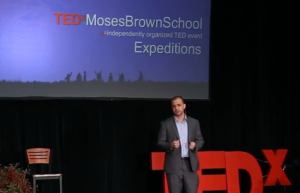 There will always be those people who feel nobody should get out of prison, or that they should not get parole, or not get opportunities like an education. Andres Idarraga is someone who got out on parole. He began educating himself while at the A.C.I. using his own money and ingenuity.
There will always be those people who feel nobody should get out of prison, or that they should not get parole, or not get opportunities like an education. Andres Idarraga is someone who got out on parole. He began educating himself while at the A.C.I. using his own money and ingenuity.
After his release, Andres spent the next seven years earning degrees from Brown and Yale. In a recent TedX Talk at Moses Brown he explains his journey up from and out of poverty, yet why that isn’t enough; why he felt the need to start Transcending Through Education Foundation (TTEF) and support other folks, inside prison and recently released, who also want to pursue a Prison-to-School pipeline.
In full disclosure, Andres is a friend of mine and co-founder of TTEF. Our friendship has spanned almost two decades, inside and out of prison, fueled by the power of inspiration. Along with Noah Kilroy, we started this foundation with our own time, effort, and money. The donations we seek are to stabilize and expand what we do.
When people talk about economic development, education, homelessness, and unemployment, they could easily add in the problem of reclaiming a major lost community resource: people. Criminalizing Rhode Island residents, beyond the punishment of a crime, is weighing down the state as a whole.
Many of the people being punished by the criminal justice system are, like I once was, broken and hopeless. As trite as it may sound, but “Hope” is a rare commodity in many places- especially prison- yet Hope is what TTEF creates. We can’t help everyone that wants an education, nor will an education ensure a job, a home, or happiness. Hope is just fuel for the journey.
]]>
- Rescue (lower right) is trained to assist people with disabilities.
Today I got a call from a friend in prison, asking if I saw his old cellmate in Fenway Park during the 7th Inning Stretch. You might have missed it, during the World Series tribute to the Boston Marathon bombing victims. There were plenty of people, smiling and waving, and James Taylor singing “God Bless America.” A standing ovation. I didn’t see his cellie.
If you look closely, there is “Rescue,” a black lab alongside a person who was wounded in the bombing. Rescue is a NEADS dog, specially trained for months to assist people with disabilities. He was trained by Steven Parkhurst, a man incarcerated in Rhode Island’s medium security facility. He has trained several dogs like Rescue and taken solace in them going out to help people. Steven is also pursuing a M.B.A. through correspondence with Adams State University, having been aided by scholarships from Transcending Through Education Foundation and the Davis Putter Scholarship Fund.

Steve told me that “The Joint went off,” when Rescue walked onto the lush green of Fenway Park. This means the place went wild like fans watching a Big Papi grand slam. It isn’t every day when you can turn on the TV and say, ‘Hey, I know that dude- he lived on my tier,’ or ‘that’s my old cellie!’ But there they were: a few hundred guys, mostly Sox fans, checking out Rescue’s major league debut. It is a rare and precious feeling to be part of something so momentous, particularly for people in prison getting an opportunity to help others.
Its a little over an hour to drive from the prison in Cranston, Rhode Island to Fenway Park. And during the 7th inning of Game 2, it got a whole lot shorter than that.
]]> Around the nation there are prosecutors who are tasked with an overwhelming number of cases. Occasionally they may have a serious felony, such as rape or murder, but what bogs them down is the immense number of simple possession charges and “broken windows” crimes as a result of police focusing on the petty, hoping to clear the streets of anyone who might commit the serious. Even children who are merely being disruptive in school (without committing a crime) have begun to clog juvenile courts. Like a waiter slammed with a lunch-hour rush, these prosecutors need to keep the assembly line moving just to keep their heads above water.
Around the nation there are prosecutors who are tasked with an overwhelming number of cases. Occasionally they may have a serious felony, such as rape or murder, but what bogs them down is the immense number of simple possession charges and “broken windows” crimes as a result of police focusing on the petty, hoping to clear the streets of anyone who might commit the serious. Even children who are merely being disruptive in school (without committing a crime) have begun to clog juvenile courts. Like a waiter slammed with a lunch-hour rush, these prosecutors need to keep the assembly line moving just to keep their heads above water.
Prosecutors live and die by the plea bargain, or “The Deal.” Nationally, over 95% of all criminal charges are resolved without trial; in some places the number can be even higher.
In courtrooms and holding cells, statements can be heard such as “The judge doesn’t like it when you file motions.” This comes from marshals, prosecutors, bailiffs, and even defense counsel. The judge is also trying to keep their head above water and get through their docket. And this is how evidence is rarely challenged, witnesses are rarely needed, and experts are rarely provided.
Prosecutors can get emotional, like anyone else, and take it personally if defense counsel does something like… defend their client vigorously.
Court employees need to understand the job of the defense counsel is to work for the client. They are obligated, by law and oath, to provide enough information to the defendants so they can make their own informed choices. Defense counsel is not allowed to make decisions for the client, nor allowed to manipulate them. If so, those lawyers could be professionally sanctioned, and even kicked out of the practice.
Do prosecutors not understand the role of defense counsel? Perhaps because prosecutors have no client, and can act autonomously in the vague name of “the State,” they forget how the adversarial system is designed to work. Realistically, if the State can’t be bothered to have their evidence scrutinized, or don’t think its worth the time to actually serve as “lawyers” (utilizing the Rules of Evidence and Procedure, along with case precedent), then the logical thing to do is to drop the charges.
Defense counsel does not work for the State, and should not be taking “advice” from the opposition any more than the coach of a team should be taking advice from the coach of their opponent. And they certainly shouldn’t need to concern themselves with what the referees think about the length of the game, or how opposing players feel about the matchup. Any opponent who is offended that their advice wasn’t heeded should just look in the mirror and ask how they would receive such advice. What if it were the defense attorneys who approached the prosecutors, after an arrest, and offered the Plea Bargain?
“Listen, my client would like to get in this treatment facility and attend community college, but you will need to drop these charges. She will agree to urine tests, however. That’s the Deal- you should take it.”
Prosecutors should know that they hold the cards as to whether the case goes forward or is dismissed. Naturally, low line prosecutors have less discretion, and are probably facing a ton of pressure to get convictions for an elected boss. District Attorneys and Attorneys General are political positions, and few have had the courage or the persuasion to get elected on anything other than “Tougher on Crime” via increased convictions and punishment.
Defense counsels who stand up to the pressures of “The Deal” should be applauded for their courage to withstand what amounts to harassment in the workplace. If they (or their clients) are given discriminatory treatment for asserting their constitutionally protected rights (including the 7th Amendment right to a jury trial), then perhaps a federal §1983 civil rights lawsuit is in order.
Dear Prosecutors: Don’t hate the players. Hate the game.